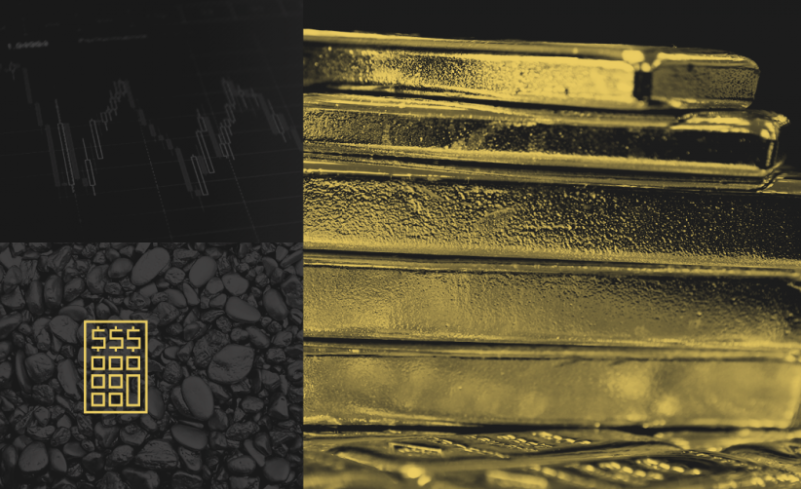This Russian-designed token wants to tackle crypto-volatility
This Russian-designed token wants to tackle crypto-volatility

In this Blockchain era where technology promises to digitize virtually any type of assets, the emergence of gold-backed tokens comes as no surprise.
The concept is not new, but we are now witnessing its first applications. One of these projects is propelled by Goldmint, a company with Russian roots now preparing for an ICO and the subsequent launch of a gold-backed crypto asset. Christened ‘GOLD,’ the token will have its value equal to that of one ounce of gold on the LBMA exchange.
This implies that GoldMint’s real gold reserves “be equal to or exceed its mined amounts of ‘GOLD’.” Thus GoldMint will “buy, sell and repurchase ‘GOLD’ at the current market price for physical gold, using exchange-traded funds (ETF) or physical gold (of 999 quality) as its security.”
What will investors be able to do with their ‘GOLD’ tokens? One of the key strengths of gold-backed assets lies in their relative stability — which is particularly appreciated as cryptocurrencies are demonstrating their high volatility.
Thus Goldmint will promote its ‘GOLD’ as a stable financial instrument to pay employees, conduct transactions or even ICOs. “If the cryptocurrency you receive in the ICO varies too sharply, there are two possible outcomes: either the currency becomes too expensive, in which case investors will be dissatisfied, or it becomes much cheaper, which is very bad for the founders who started the ICO,” the Goldmint team explained to East-West Digital News.
Even though most members of blockchain community are aware of the issue, “there is currently no practical possibility to use a gold-backed cryptocurrency for an ICO — and this is the market need we’re going to address,” Goldmint says.
‘GOLD’ may also be used by traders and other cryptocurrency users to “hedge their gold commodity with ‘GOLD’ on any cryptocurrency trading exchange, without leaving that particular platform. Traders [will also be able to] diversify their trading portfolio with ‘GOLD’ assets,” according to the company.
The company also recommends ‘GOLD’ as a means to purchase and transport physical gold: “You can convert your physical gold into ‘GOLD’ in any bank that uses the GoldMint blockchain platform. This does not only protect your gold in cross-country transportation, it also simplifies the process.”
Her Majesty’s government in the running
No such gold-backed crypto assets seem to be available yet to individual investors — but Goldmint is not the only startup in the running. One of its strongest future competitors could be Singapore-based DigixDAO, which plans to launch its ‘Digix Gold Tokens’ (DGX) in the near future. These crypto-assets are set to become “the future gold standard for value exchange in the Ethereum ecosystem,” claims the company. Launched in 2014, DigixDAO raised $ 5.5 million in Ethereum’s first on-chain crowd-sale in March 2016.
Chinese ZenGold (ZGC) also successfully completed an ICO in May 2017, raising over 2,000 BTC in less than a minute. Its plan is to launch “a smart asset system backed by physical gold” using the Metaverse blockchain, but the current activities of the company and its platform are unclear at least to non-Chinese speakers (1).
The Royal Mint, a company owned by the UK government, has put its “more than 1,000 years of experience” in a project of gold-backed tokens, scheduled for launch in late 2017. Dubbed ‘Royal Mint Gold’ (RMG), these tokens are intended for investors through third-party investment intermediaries such as banks and brokers instead of being sold to individuals directly.
Another player, LAToken, comes from Russia. Having just raised the equivalent of $ 10 million in the first phase of its ICO, this platform aims to tokenize virtually any kind of assets including stocks, real estate, works of art, and of course silver and gold.
Tokenizing $ 100 billion worth of gold
Even tough the success of these new types of cryptoassets is yet to be confirmed, the startups propelling them are not short of ambition. “Our idea is revolutionary,” claims Goldmint: “We plan to convert [dozens of thousands of tons of gold] into blockchain-encrypted tokens to help owners protect their valuables, to help investors move their gold rapidly and easily from one part of the world to another, and to help companies and individuals hedge their gold against market volatility.”
Thus, the company aims to “gain access to 1% of global gold circulation (over 300 tons)” by launching its Custody Bot automated storage facilities in pawnshops around the world; “another 5%” of gold circulation by introducing them in shopping centers, with the ultimate goal of controlling “10% of gold reserves, worth more than $ 100 billion.”
Goldmint will initially target Asia and Eastern Europe: “We have many robust partnerships in these areas, which will help us to run our business faster. Then we see India and OAE as very interesting countries where our Custody Bot and the gold-backed crypto asset will be very in-demand,” the team told EWDN.
Goldmint has requested Deloitte, as well as Elina Sidorenko in Russia and Julia Zegelman in the USA, to establish the legal status of ‘GOLD’ in different countries.
“Once banks decide how to legally and fiscally regulate GOLD, clients will be able to exchange dollars, foreign currency, and gold bullion to ‘GOLD’ and to fully benefit from all aspects of the cryptocurrency market,” Goldmint claims.
This story first appeared in East-West Digital News, a tech news site covering Eastern Europe and a syndication partner of ReadWrite.
The post This Russian-designed token wants to tackle crypto-volatility appeared first on ReadWrite.
(37)


